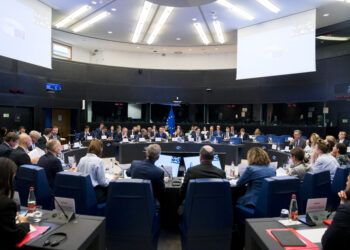Brussels – Two urgent priorities: Russia’s war in Ukraine and the Middle East conflict. There are few doubts on the former: “Kyiv must win with the necessary military and economic assistance,” and on the latter, there are many unknowns. Kaja Kallas, nominated by the governments of the 27 to replace Josep Borrell as EU High Representative for Foreign Affairs, submitted herself this morning (Nov. 12) to the EU Parliament’s scrutiny, at the same time as Raffaele Fitto’s hearing. Together with the Italian and the other executive vice presidents of the European Commission nominees, Kallas will have to wait until tomorrow—or even next week—to know the outcome of his “examination”.
On the pro-European vocation of the former Liberal MEP, who is part of Renew’s political family in Brussels, and on the knowledge of the international stage acquired in her four years as prime minister of Estonia, no perplexities. But the go-ahead for Kaja Kallas will not come today: parliamentary sources confirm that the political groups have decided to evaluate the hearings of von der Leyen’s six deputies as a package to avert possible backstabbing, particularly on Fitto and Spanish socialist Teresa Ribera.
For Kallas, a 47-year-old who “grew up behind the Iron Curtain” in the then Soviet republic of Estonia, public enemy number one can only be Vladimir Putin’s Russia. Along with China, North Korea and Iran, the actors who “aim to change the international order.” The four of them produce “more ammunition than the entire Euro-Atlantic alliance,” the Estonian liberal pointed out, announcing the drafting of a defence white paper in the first 100 days of her term and close cooperation with the future EU defence commissioner.
On Ukraine, Kallas stands in full continuity with the line drawn by his predecessor Borrell, consisting of economic and military support on the one hand and political and diplomatic support on the other. “The war will end when Russia realizes it has made a mistake,” Kallas said, dispelling any doubts about the possibility of the EU endorsing a peace negotiation with Moscow that is not “a sustainable peace” on Kyiv’s terms. Indeed, according to the former Estonian premier, the U.S. president-elect, Donald Trump, “should be concerned about how we respond to Russia’s war in Ukraine” because it is closely linked to the antagonism between Washington and Beijing. For Kallas, the transatlantic bond will remain inescapable because “we are the strongest alliance, and we must remain close.” To sovereignist MEPs on the Foreign Affairs Committee (AFET) who pressed her on what she called the “failed” policy of European sanctions on Moscow, Kallas replied harshly, “You are just repeating false Russian narratives.”
For Kallas, the reason why the EU should not give in and make concessions to Moscow is natural: “If aggression pays somewhere,” it would be “an invitation to others to do it elsewhere.” If Russia gets something, then “everyone could wage wars and take what they want.” Clarifying this point, Kallas inevitably lent herself open to accusations of applying double standards in Ukraine and the Middle East.
Kallas on suspension of EU-Israel Agreement: “Discuss it with Tel Aviv”
Accusations promptly rejected: “We are the largest donor to the Palestinian National Authority and in support of the Palestinian people,” Kallas claimed. The impression, however, is that precisely on the position concerning the disproportionate Israeli military response, there might be a rift between Borrell’s and Kallas’s courses as head of European diplomacy. The former, who since Oct. 7, 2023, has been constantly trying to push member states to increase pressure on Netanyahu’s government, the latter is more cautious about criticism of Tel Aviv.
The former Estonian premier listed on which points the EU common position is based—”the ceasefire and the release of hostages, humanitarian action, support for the PNA and Israel’s right to exist, the two-state solution”—but preferred not to answer those who asked her what tools Brussels has in hand to make Israel end the slaughter in Gaza and the forced occupation of the Palestinian territories.
“I am a strong supporter of international and humanitarian law, which means protecting the population and not attacking civilian infrastructure,” Kallas defended herself and continued: “We are focused on bringing humanitarian aid to Gaza, but we are also raising the issue with Israel.” In the middle is the EU-Israel Association Agreement, one of the most inclusive ever signed by Brussels with a partner country, which includes clear constraints on respect for human rights and which the EU could suspend in light of the dozens of reports from international organizations documenting the atrocities of Israeli warfare.
“There should be an Association Council meeting with Israel where all member states can raise the issue,” Kallas said. Omitting that Borrell himself is pushing for a discussion without Tel Aviv, because Benjamin Netanyahu’s government has already refused to participate in an Association Council dedicated to respect for human rights. Perhaps the most controversial moment, however, was when Kallas— twice—chose to quote David Ben Gurion, the historic prime minister of the State of Israel, to demonstrate her attachment to the rights of the Palestinian people. The State of Israel is founded “on security and justice,” Kallas reported from Ben Gurion. Yet, even after the Palestinian Nakba, he always refused to regard the borders of the State of Israel as final, paving the way for later annexations.
English version by the Translation Service of Withub






![La presidente della Bce, Christine Lagarde [Francoforte, 6 marzo 2025]](https://www.eunews.it/wp-content/uploads/2025/03/lagarde-250306-120x86.png)

![Un atomo. L'Ue punta sul nucleare di nuova generazione per il suo futuro energetico [foto: iStock]](https://www.eunews.it/wp-content/uploads/2025/04/atomo-120x86.jpeg)
